
Afrobeat is a West African music genre that involves the combination of West African musical styles from mainly Nigeria such as the traditional Yoruba and Igbo music and highlife with American funk, jazz, and soul influences. With a focus on chanted vocals, complex intersecting rhythms, and percussion. The style was pioneered in the 1960s by Nigerian multi-instrumentalist and bandleader Fela Kuti, who is most known for popularizing the style both within and outside Nigeria. At the height of his popularity, he was referred to as one of Africa's most "challenging and charismatic music performers."
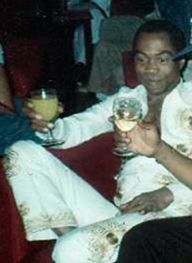
Fela Aníkúlápó Kútì, also famously known as Abàmì Ẹ̀dá, was a Nigerian musician, bandleader, composer, political activist, and Pan-Africanist. He is regarded as the King of Afrobeat, a Nigerian music genre that combines West African music with African-American funk and jazz. At the height of his popularity, he was referred to as one of Africa's most "challenging and charismatic music performers". AllMusic described him as "a musical and sociopolitical voice" of international significance.
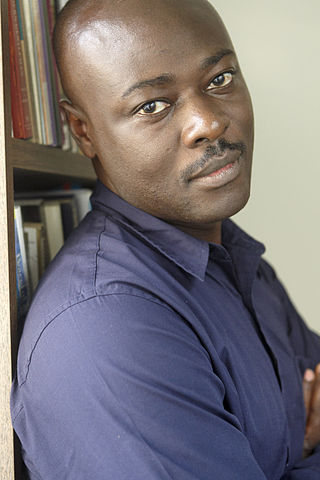
Helon Habila Ngalabak is a Nigerian novelist and poet, whose writing has won many prizes, including the Caine Prize in 2001. He worked as a lecturer and journalist in Nigeria before moving in 2002 to England, where he was a Chevening Scholar at the University of East Anglia, and now teaches creative writing at George Mason University, Fairfax, Virginia.

Adrian Igonibo Barrett is a Nigerian writer of short stories and novels. In 2014, he was named on the Africa39 list of writers aged under 40 with potential and talent to define future trends in African literature. Following his two collections of short stories – From Caves of Rotten Teeth (2005) and Love Is Power, or Something Like That (2013) – his first novel, Blackass, was published in 2015, described by the Chicago Review of Books as "Kafka with a wink".

Oluseun Anikulapo Kuti, popularly known Seun Kuti, is a Nigerian musician, singer and the youngest son of Afrobeat pioneer Fela Kuti. Seun leads his father's former band Egypt 80.
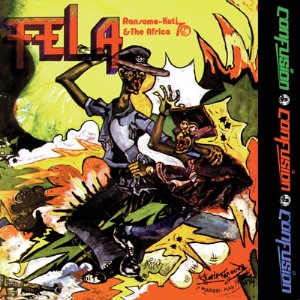
Confusion is a 1975 album by Nigerian Afrobeat musician Fela Kuti and his Africa 70 band. It was arranged, composed, and produced by Kuti, who recorded the album after choosing to emphasize his African heritage and nationalism in his music. Confusion is a commentary on the confused state of post-colonial Lagos and its lack of infrastructure and proper leadership at the time. Kuti's pidgin English lyrics depict difficult conditions in the city, including a frenetic, multilingual trading market and inextricable traffic jams in Lagos' major intersections.

Soundway Records is a British, London-based independent record label, founded and run by English DJ and music producer Miles Cleret. Since its initial release of a collection of Ghanaian music in 2002, it has released compilation albums of African, Caribbean, Latin, and Asian music from the 1950s to 1980s.

Felabration is an annual music festival conceived in 1998 by Yeni Anikulapo-Kuti in memory and celebration of her father Fela Kuti, a Nigerian musician and human rights activist known for pioneering the afrobeat genre of music. The one-week-long event which is held annually at the New Afrika Shrine in Ikeja, attracts visitors from different countries and has thus been considered as an official tourist destination by the Lagos State Government.

Victor Ehikhamenor is a Nigerian visual artist, writer, and photographer known for his expansive works that engage with multinational cultural heritage and postcolonial socioeconomics of contemporary black lives. In 2017, he was selected to represent Nigeria at the Venice Biennale, the first time Nigeria would be represented in the event. His work has been described as representing "a symbol of resistance" to colonialism.
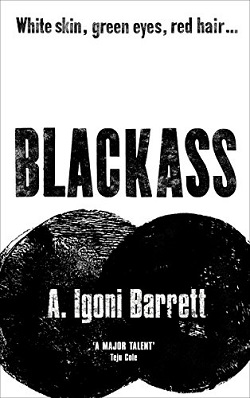
Blackass is a novel by Nigerian author A. Igoni Barrett. It was released in the United Kingdom and Nigeria in 2015, and 2016 in the United States. It received mixed reviews.
Oil on Water is a 2010 petrofiction novel by Nigerian author Helon Habila. The novel documents the experience of two journalists as they try to rescue a kidnapped European wife in the oil landscape of the Niger Delta. The novel explores themes of both the ecological and political consequences of oil conflict and petrodollars in the delta.

Imachibundu Oluwadara Onuzo is a Nigerian novelist. Her first novel, The Spider King's Daughter, won a Betty Trask Award, was shortlisted for the Dylan Thomas Prize and the Commonwealth Book Prize, and was longlisted for the Desmond Elliott Prize and the Etisalat Prize for Literature.

Ayọ̀bámi Adébáyọ̀ is a Nigerian writer. Her 2017 debut novel, Stay With Me, won the 9mobile Prize for Literature and the Prix Les Afriques. She was awarded The Future Awards Africa Prize for Arts and Culture in 2017.
Parrésia, also Parrésia Publishers Ltd, is a publishing company in Nigeria founded by Azafi Omoluabi Ogosi and Richard Ali in 2012 with the aim of selling books to the Nigerian reading audience and promote the freedom of the imagination and the free press. It was described in 2017 by The New York Times as one of "a handful of influential new publishing houses" in Africa in the last decade.

Teacher Don't Teach Me Nonsense is a 1986 studio album by Fela Kuti and the Egypt 80.

Ọmọ́rìnmádé Kútì known professionally as Made Kuti, is a Nigerian afrobeat singer, songwriter and instrumentalist. He released his debut album titled For(e)ward in 2021.
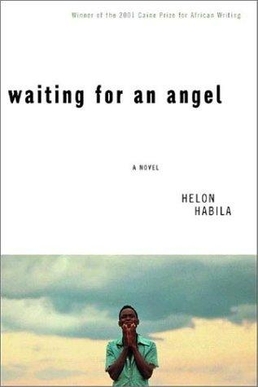
Waiting for an Angel is a 2002 political novel written by Nigeria writer Helon Habila. It was first published by New York's publishing firm W. W. Norton & Company.

Prison Stories, styled as Prison Stories: A Collection of Short Storie[s], is a collection of prison stories by Nigerian writer Helon Habila. "Love Poem", which is among the stories included in the collection, won the 2001 Caine Prize for African Writing. It was first published by Epic Books.

Travelers is a 2019 novel by Nigerian author Helon Habila. It was published by W. W. Norton & Company. The story revolves around the life of a Nigerian expatriate who travels around Europe to know more about African refugees.

The Chibok Girls styled as The Chibok Girls: The Boko Haram Kidnappings and Islamist Militancy in Nigeria is a 2016 non-fiction social novel by Nigerian author Helon Habila. The novel was developed due to 2014 kidnaping of 276 Chibok school girls from age 16 to 18 by the Islamic terrorist group Boko Haram.


















